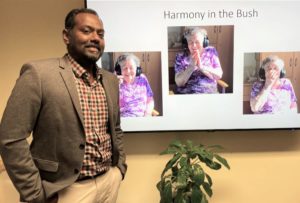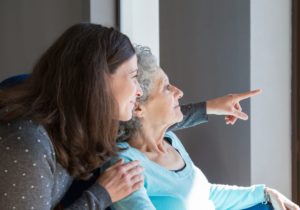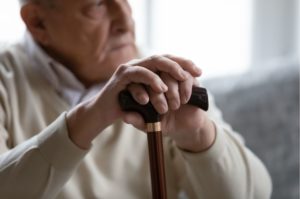
Rising levels of dementia is putting pressure on residential aged care facilities, including in rural and regional centres where nursing homes and staff are already under pressure.
Now a pilot program of personalised interventions, including residents’ favourite songs, has been shown to make a big difference to dementia behaviours, drug use and carers’ wellbeing.

Harmony in the Bush, a study led by Flinders University in five nursing homes in Queensland and South Australia, developed a multimodal person-centred non-pharmacological intervention program incorporating individual music selections to reduce, resulting in a significant reduction in resident agitation and staff stress levels.
The focus on resident-centred therapies, rather than drug interventions, led to less dysfunctional behaviours and psychological symptoms in the trial group of 74 people living with dementia and reduced stress reported by the 87 staff in aged care homes who took part in the study.
More than one-third of the residents reported mild-severe pain and mild-severe sadness before the intervention.
“The Harmony in the Bush model is effective in reducing agitation among dementia residents with the important spinoff of significant reduction in staff stress levels in nursing homes in rural Australia,” says researcher Dr Vivian Isaac, lead author on a new article in BMC Geriatrics.
The Flinders Rural and Remote Health team also found a reduction in the use of psychotropic medications and inappropriate medications when comparing residents’ medication charts data covering three months pre- and post- the Harmony in the Bush intervention, as published recently in BMC Psychiatry.
In Australia, 60-70% of the people residing in nursing homes have dementia and about 70-90% of residents with dementia suffer from psychiatric or behavioral symptoms.
“The study found that the model gives staff with a structure to learn person-centred practice over about one month to reduce the impact of behavioural and psychiatric symptoms of dementia.

“The results show a statistically significant decline in aggressive behaviours, physically non-aggressive behaviours, and inappropriate verbal behaviour, hiding or hoarding – with a similar reduction in staff stress and resident safety when resources for specialised dementia care may be limited.”
The study provides promising evidence on the potential of this novel model in low-resourced settings, researchers says.
Further studies will look at the cost-effectiveness and reliability of the model, which researchers have based on the Progressively Lowered Stress Threshold principles and person-centered music in nursing homes (using personal devices during rest time) to reduce agitation and other stressful behaviours.
Music has proved helpful in dementia to raise mood, stimulate memories and provide a soothing effect.
These behaviours include agitation, mood dysregulation, and disturbed thoughts and perceptions, which pose a major challenge for the residents with dementia and nursing home staff.
The paper, The outcomes of a person-centered, non-pharmacological intervention in reducing agitation in residents with dementia in Australian rural nursing homes (2021) by Vivian Isaac, Abraham Kuot, Mohammad Hamiduzzaman, Edward Strivens (James Cook University) and Jennene Greenhill (2021) by was published in BMC Geriatrics DOI: 10.21203/rs.3.rs-38968/v2

Also Person-centered non-pharmacological intervention in reducing psychotropic medications use among residents with dementia in Australian rural aged care homes (2021) by DR Parajuli, A Kuot, M Hamiduzzaman, J Gladman and V Isaac in T DOI 10.1186/s12888-020-03033-w
Funding for the project was provided by the Department of Health under the National Aged Care Services Fund project (4-4ZOHI8C).

